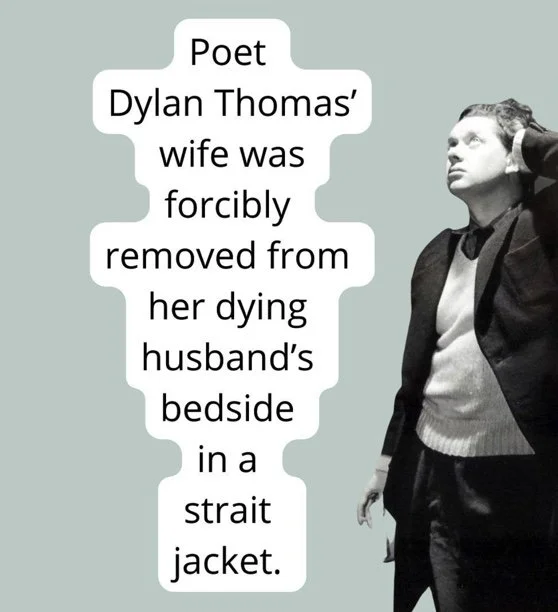Dylan Thomas’ Death
Dylan Thomas’ poetry was widely published and critically acclaimed. His alcohol addiction and prolific womanizing was perhaps most notable and hotly covered by the media of his time.
Two of Thomas’ most beloved poems “Death Shall Have No Dominion” and “Do Not Go Gently Into That Good Night” have death as their preeminent focus. Both display Thomas’ paradoxical dichotomy; Thomas both lived in true awareness of his own mortality and was overwhelmed with existential fear of it.
Dylan Thomas died before he turned 40 and his death is widely thought to have resulted from alcohol addiction. But below this obvious factor lie suggestions that Thomas also suffered from medical negligence (untreated bronchitis and pneumonia though under a doctor’s care), severe depression and perhaps an overuse of morphine. It has also been suggested that Thomas lost his will to live, frequently speaking of his impending death, referring to his wife as a widow, etc.
After a night of heavy drinking Thomas never recovered, eventually slipping into a coma and dying in a hospital in New York City while on an American tour. When his estranged wife flew in to be at his bedside, his mistress fled. His wife was horrified at the manner of his care. As a public persona, Thomas was “on display” at the hospital and his room was unfiltered. Though the hospital claimed his wife was asked to leave because of inappropriate behavior (smoking near the oxygen, breaking a crucifix, biting a nurse), the wife later recalled that she was dismayed at the way his dying body was splayed out for uncensored visitation, his privacy neglected, his care unacceptable. Either way, it is agreed that Caitlin Thomas was carried out of the hospital in a strait jacked and forcibly admitted to a sanitarium.
Thomas’ death is detailed in “The Violet Hour” by Katie Roiphe and in her words, “The poet’s morbid and overblown fear of death transformed itself into barreling headlong for it.” Something to chew on.

